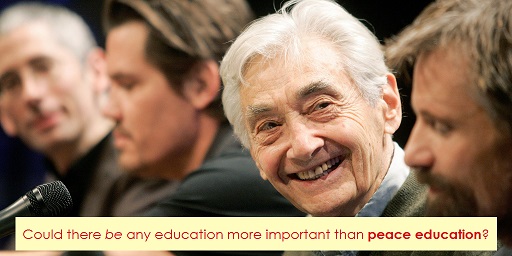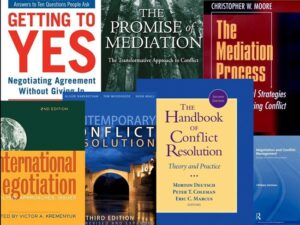(This is section 59 of the World Beyond War white paper A Global Security System: An Alternative to War. Continue to preceding | following section.)

(Please retweet this message, and support all of World Beyond War’s social media campaigns.)
For millennia we educated ourselves about war, focusing our best minds on how to win it. Just as narrow-minded historians had insisted there was no such thing as Black history or women’s history, so too they argued there was no such thing as the history of peace. Humanity had failed to focus on peace until the new fields of peace research and peace education developed in the wake of the catastrophe that was World War II and accelerated in the 1980s after the world came close to nuclear annihilation. In the years since, there has been a vast increase in information about the conditions of peace. Institutions such as the Peace Research Institute (PRIO), an independent, international organization based in Oslo, Norway, conduct research on the conditions of peace between states, groups and people.note8 PRIO identifies new trends in global conflict and responses to armed conflict in order to understand how people are impacted by and cope with it and they study the normative foundations of peace, seeking answers to such questions as why do wars occur, how are they sustained, what does it take to build a durable peace. They have published the Journal of Peace Research for 50 years.
Likewise, SIPRI, the Swedish International Peace Research Institute, is engaged in comprehensive research and publication on conflict and peace on a global scale. Their website reads:note9
SIPRI publishes several data bases and has produced hundreds of books, articles, fact sheets, and policy briefs since 1969.
 The United States Institute of Peace was established by Congress in 1984 as an independent, federally-funded national security institution devoted to the nonviolent prevention and mitigation of deadly conflict abroad.note10 It sponsors events, provides education and training and publications including a Peacemaker’s Tool Kit. Unfortunately, the U.S. Institute of Peace has never been known to oppose U.S. wars. But all these institutions are substantial steps in the direction of spreading understanding of peaceful alternatives.
The United States Institute of Peace was established by Congress in 1984 as an independent, federally-funded national security institution devoted to the nonviolent prevention and mitigation of deadly conflict abroad.note10 It sponsors events, provides education and training and publications including a Peacemaker’s Tool Kit. Unfortunately, the U.S. Institute of Peace has never been known to oppose U.S. wars. But all these institutions are substantial steps in the direction of spreading understanding of peaceful alternatives.
In addition to these organizations in peace research many other institutions such as the International Peace Research Associationnote11 or universities sponsor research and publish journals such as the Kroc Institute at Notre Dame, et alia. For example,
These organizations are a small sample of the institutions and individuals working on peace research. We have learned a great deal about how to create and maintain peace in the last fifty years. We are at a stage in human history where we can say with confidence that we know better and more effective alternatives to war and violence. Much of their work has provided for the development and growth of peace education.
Peace Education now embraces all levels of formal education from kindergarten through doctoral studies. Hundreds of college campuses provide majors, minors and certificate programs in peace education. At the university level the Peace and Justice Studies Association gathers researchers, teachers and peace activists for conferences and publishes a journal, The Peace Chronicle, and provides a resource base. Curricula and courses have multiplied and are taught as age-specific instruction at all levels. In addition a whole new field of literature has developed including hundreds of books, articles, videos and films about peace now available to the general public.
(Continue to preceding | following section.)
We want to hear from you! (Please share comments below)
How has this led you to think differently about alternatives to war?
What would you add, or change, or question about this?
What can you do to help more people understand about these alternatives to war?
How can you take action to make this alternative to war a reality?
Please share this material widely!
Related posts
See other posts related to “Creating a Culture of Peace”
See full table of contents for A Global Security System: An Alternative to War
Notes:
8. http://www.prio.org/ (return to main article)
9. http://www.sipri.org/ (return to main article)
10. http://www.usip.org/ (return to main article)
11. In addition to the International Peace Research Association, there are five affiliated regional peace research associations: Africa Peace Research Association, Asia-Pacific Peace Research Association, Latin America Peace Research Association, European Peace Research Association, and the North American Peace and Justice Studies Association. (return to main article)












2 Responses
Great resources here. I am most interested in the economics of peace – how we can move, in the US but also globally, from economies dominated by militarism/wars to those formed by peace. I think a focus on money and economics will make “peace” a more tangible, practical and pro-active concept for people in their home communities. “Peace” is often thought of as a far-off ideal rather than something that we make, grow, enjoy and use.
சமாதானத்தின் முக்கியத்துவத்தை எடுத்துக் கூற முடியுமா?